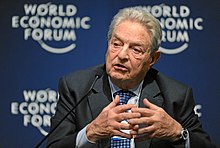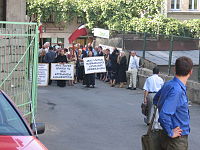George Soros
[28] György Schwartz was born on 12 August 1930 in Budapest in the Kingdom of Hungary to a prosperous non-observant Jewish family, who, like many upper-middle class Hungarian Jews at the time, were uncomfortable with their roots.
[47] Later that year at age 14, Soros posed as the Christian godson of an official of the collaborationist Hungarian government's Ministry of Agriculture, who himself had a Jewish wife in hiding.
Soros argued that this process leads to markets having procyclical "virtuous" or "vicious" cycles of boom and bust, in contrast to the equilibrium predictions of more standard neoclassical economics.
In 1989, the Commission des Opérations de Bourse (COB, the French stock exchange regulatory authority) conducted an investigation of whether Soros's transaction in Société Générale should be considered insider trading.
[89] On the basis of Article 7 of the European Convention on Human Rights, stating that no person may be punished for an act that was not a criminal offense at the time that it was committed, the court agreed to hear the appeal.
In many districts, such large contributions were unprecedented and the campaigning strategy was "turned on its head" with a focus on incarceration, police misconduct and bail system, according to the Los Angeles Times.
[104] According to Waldemar A. Nielsen, an authority on American philanthropy,[105] "[Soros] has undertaken... nothing less than to open up the once-closed communist societies of Eastern Europe to a free flow of ideas and scientific knowledge from the outside world".
[106] From 1979, as an advocate of 'open societies', Soros financially supported dissidents including Poland's Solidarity movement, Charter 77 in Czechoslovakia and Andrei Sakharov in the Soviet Union.
[109] His funding of pro-democratic programs in Georgia was considered by Georgian nationalists to be crucial to the success of the Rose Revolution, although Soros has said that his role has been "greatly exaggerated".
According to The New York Times 1997, the Belarusian president Alexander Lukashenko has been widely criticized in the West and in Russia for his efforts to control the Belarus Soros Foundation and other independent NGOs and to suppress civil and human rights.
The government has attacked OSF, the international civil support foundation created by George Soros, and tried to revoke the licence of Central European University (Budapest) (which failed mostly due to significant public outrage).
His support was reflected "in carrying out studies and obtaining data that gave us information that had been kept from us for 17 years (...) What we learned there was crucial for the preparation of the famous television program of the 'No' campaign and for the victory in the plebiscite.
[133] Soros donated $1.4 million to publicity efforts to support California's Proposition 5 in 2008, a failed ballot measure that would have expanded drug rehabilitation programs as alternatives to prison for persons convicted of non-violent drug-related offenses.
[136] Soros has been a major financier of the Drug Policy Alliance – an organization that promotes cannabis legalization – with roughly $5 million in annual contributions from one of his foundations.
According to anthropologist Ivan Kalmar, "Many of his most outspoken enemies inside and outside Hungary saw him as leading an international cabal that included other Jews such as the Rothschilds, as well as Freemasons and Illuminati".
[164] Speaking before a 2003 conference of the Jewish Funders Network, Soros said that the administrations of George W. Bush in the U.S. and Ariel Sharon in Israel, and even the unintended consequences of some of his own actions, were partially contributing to a new European antisemitism.
Soros, citing accusations that he was one of the "Jewish financiers" who, in antisemitic terms, "ruled the world by proxy", suggested that, if the direction of those policies were changed, then anti-Semitism would diminish.
Abraham Foxman, national director of the Anti-Defamation League later said that Soros's comments held a simplistic view, were counterproductive, biased and a bigoted perception of the situation, and "blamed the victim" when holding Jews responsible for antisemitism.
[173] Soros called Steinmetz's suit "frivolous and entirely false" and said that it was "a desperate PR stunt meant to deflect attention from BSGR's mounting legal problems across multiple jurisdictions".
[177] According to the Israeli ambassador, the campaign "evokes sad memories but also sows hatred and fear", a reference to Hungary's role in the deportation of 500,000 Jews during the Holocaust.
On September 28, 2004, he dedicated more money to the campaign and kicked off his own multistate tour with a speech, "Why We Must Not Re-elect President Bush",[188] delivered at the National Press Club in Washington, D.C.
The online transcript of this speech received many views after Dick Cheney accidentally referred to FactCheck.org as "factcheck.com" in the vice presidential debate, causing the owner of that domain to redirect all traffic to Soros's site.
In October 2015, Soros criticized Hungarian Prime Minister Viktor Orbán and his handling of the 2015 European migrant crisis: "His plan treats the protection of national borders as the objective and the refugees as an obstacle.
Soros's Open Society Foundations also donated a total of £303,000 to two pro-EU organizations, the European Movement UK and Scientists for EU, and a center-right think-tank, Bright Blue.
He also urged the United States not to allow the Chinese technology companies Huawei and ZTE to dominate the 5G telecommunications market as this would present an "unacceptable security risk for the rest of the world".
[206] Additionally, Soros is very critical of American companies that ignore Chinese human rights violations for business reasons, for example slamming BlackRock's decision to invest big in China as detrimental to worldwide democracy and US national security.
[220] He has also donated 64% of his original fortune, of which more than $15 billion has been distibuted through his Open Society Foundations (an international grant making network that supports advancing justice, education, public health and independent media).
[citation needed] In September 2006, Soros pledged $50 million to the Millennium Promise, led by economist Jeffrey Sachs to provide educational, agricultural, and medical aid to help villages in Africa enduring poverty.
[225] Soros played a role in the peaceful transition from communism to democracy in Hungary (1984–89)[25] and provided a substantial endowment to Central European University in Budapest.
[257] In January 2014, Soros was ranked number 1 in LCH Investments list of top 20 managers having posting gains of almost $42 billion since the launch of his Quantum Endowment Fund in 1973.




